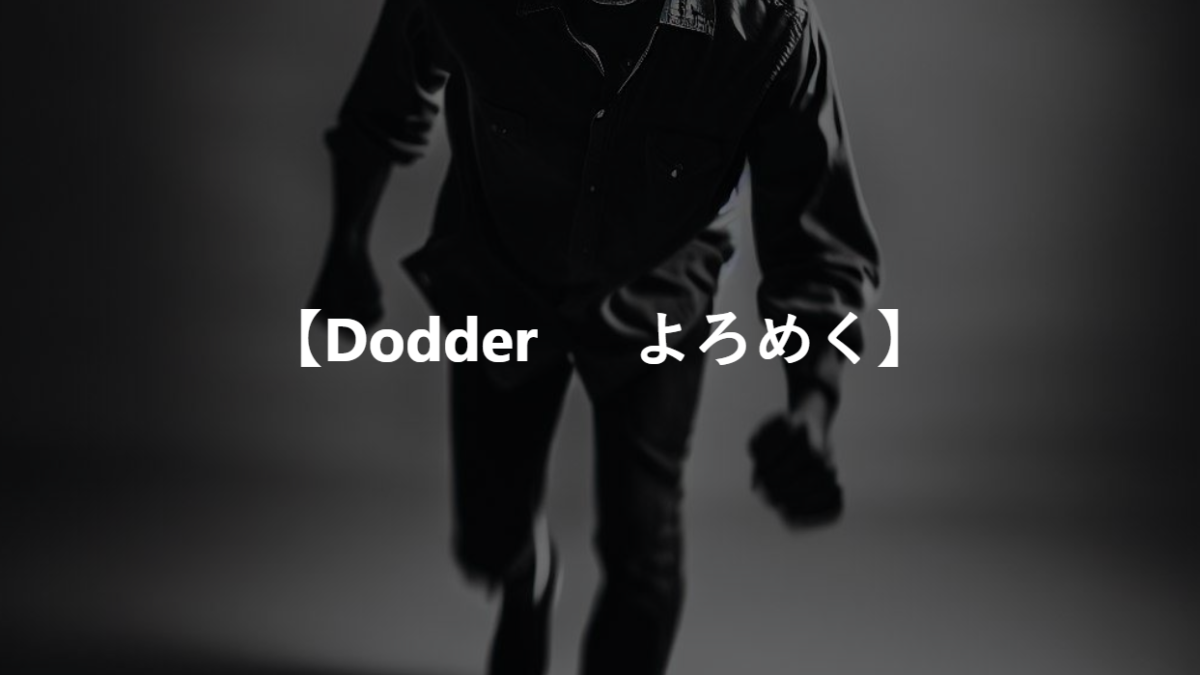語源・類義語・反対語・例文
【Dodder よろめく】という単語の語源とか由来を知っていますか?
「Dodder」は、「よろめく」「ふらふらする」といった意味を持つ動詞で、物理的な不安定さや動きの不確かさを表現するのに使われます。この単語の語源は完全には明らかではありませんが、一部の語源学者は「dodder」が中英語の「daderen」に由来すると考えています。これは「振動する」「揺れ動く」といった意味を持ち、さらに古い形では古英語の時代にまでさかのぼる可能性があります。しかし、その正確な起源は不確かで、古英語における類似の語根から派生した可能性も考えられますが、具体的な記録は残っていません。
「Dodder」は現代英語においても使用され、主に年齢による身体的な衰えや疲労、または不安定な足取りを表す際に用いられます。この単語は、特に高齢者や体力が落ちている人々の歩行を描写するのに適した言葉として、文学や日常会話で見られることがあります。
The verb “dodder” means “to tremble” or “to totter,” used to describe physical instability or the uncertainty of movement. The origins of this word are not entirely clear, but some etymologists believe “dodder” derives from the Middle English “daderen,” which means “to tremble” or “to shake.” This, in turn, may trace back even further to Old English, although the precise lineage is uncertain. There is speculation that it could have evolved from a similar root in Old English, but specific records are lacking.
In modern English, “dodder” continues to be used, primarily to denote the physical decline associated with age, fatigue, or an unsteady gait. This word is particularly apt for describing the way elderly people or those who are physically weakened walk, and it can be found in literature and everyday conversation.
この単語の類義語・反対語を教えてください。
類義語
- Totter – ふらふらする
- Tremble – 震える
- Stagger – よろめく
- Wobble – よろめく、揺れ動く
- Falter – 躓く、ためらう
- Teeter – ぐらつく
- Shake – 揺れる
- Lurch – ふらつく
反対語
- Stride – 大股に歩く
- March – 行進する
- Steady – 安定した
- Stabilize – 安定させる
- Balance – バランスを取る
- Glide – 滑るように動く
- Stroll – ぶらぶら歩く(安定した歩行)
- Stand firm – しっかり立つ
この単語に似た単語で間違いやすい単語はありますか?
- Totter – 「Totter」と「Dodder」は非常に似ており、どちらも不安定な歩行を表すのに使われますが、「Totter」は特にバランスを保つのが難しい状態、例えば高いところを歩いている時のぐらつきを強調することが多いです。
- Stagger – 「Stagger」と「Dodder」もよく似ていますが、「Stagger」はショックや驚き、酔いなどによる突然のよろめきを指すことが多く、原因がより明確な場合に使われることがあります。
- Wobble – 「Wobble」は「Dodder」と似ており、不安定さを示しますが、物体や身体の部分(例えば頭や手)が揺れる動きを指すことが多く、歩行以外にも広く使われます。
- Lurch – 「Lurch」は、特に前方への急な動きや不意のよろめきを表すのに使われ、「Dodder」と比較して動作が大きく、しばしば外的な原因によるものを暗示します。
この単語を使った例文を5つほど教えてください。
The old man struggled to walk steadily, doddering along the path.
(老人はしっかり歩くことに苦労し、よろめきながら道を歩いた。)
The toddler tried to take his first steps, but he doddered and fell to the ground.
(幼児は初めての一歩を踏み出そうとしたが、よろめいて地面に倒れた。)
The building, weakened by the earthquake, began to dodder and eventually collapsed.
(地震で弱まった建物は揺れ始め、最終的に崩壊した。)
The drunken man stumbled out of the bar, doddering as he made his way down the street.
(泥酔した男がバーからよろめきながら出てきて、通りを進んだ。)
The tree was covered in dodder, a parasitic plant that was slowly draining its nutrients.
(その木はドジャーと呼ばれる寄生植物に覆われており、ゆっくりと栄養を吸い取られていた。)
【Dodder よろめく】のコロケーション
- dodder along – よろめきながら進む
- 遅くて不安定な歩き方をしている様子を表します。特に年配の人や体力が落ちている人の歩行を描写する際に用いられます。
- dodder on one’s feet – 足元がふらつく
- 立っているときにバランスを保つのが難しい状態を指します。疲労や弱さが原因で足元が不安定になる様子を示します。
- dodder to the door – ドアまでよろめきながら行く
- ある目的地(この場合はドア)まで不安定に歩く様子を表します。目的地に向かって進むが、その過程で体がふらつくことを強調します。
- dodder with age – 年齢でふらつく
- 年老いたことによる身体的な衰えや不安定さを指します。年齢に伴う自然な変化が原因でよろめくことを示しています。
- dodder home – 家によろめきながら帰る
- 家へ帰る途中での不安定な歩行を描写します。疲れや他の理由で家に帰る際に体がふらつく様子を表します。
「Dodder」という単語は、「よろめく」や「ふらふらする」という意味で使われ、身体的な不安定さや歩行の不確かさを表現する際に使用されます。ここで紹介した「dodder」のコロケーションは、この動詞が様々な文脈でどのように使われるかの具体的な例を提供しています。
「dodder along」は、遅くて不安定な歩き方をしている様子を表し、特に年配の人や体力が落ちている人の歩行を描写する際に用いられます。これは、ゆっくりとしかし不安定に進むことの視覚的なイメージを提供します。
「dodder on one’s feet」は、立っているときに足元がふらつく状態を指し、疲労や弱さによる身体的な不安定さを示します。これは、静止しているにもかかわらずバランスを取ることが困難であることを強調します。
「dodder to the door」は、ある目的地まで不安定に歩く様子を表し、目的地に向かって進むが、その過程で体がふらつくことを表現します。これは、目的意識はあるものの、身体的な不安定さに苦しんでいる状況を描写します。
「dodder with age」は、年齢による身体的な衰えや不安定さを指し、年齢に伴う自然な変化が原因でよろめくことを示します。この表現は、加齢による変化を理解し、共感するために使われます。
「dodder home」は、家に帰る途中での不安定な歩行を描写し、疲れや他の理由で家に帰る際に体がふらつく様子を表します。これは、家への帰路が身体的な挑戦となることがあることを示しています。
これらの「dodder」の使用例を通じて、「よろめく」という行動がどのように多様なシナリオで表現されるかがわかります。身体的な不安定さや歩行の不確かさを強調する際に、「dodder」は非常に役立つ単語です。
The word “dodder” is used to mean “to totter” or “to sway,” indicating physical instability or uncertainty in walking. The collocations of “dodder” introduced here provide specific examples of how this verb is utilized in various contexts.
“Dodder along” describes the act of walking slowly and unsteadily, often used to depict the movement of elderly people or those who are physically weakened. It provides a visual image of moving forward slowly yet unsteadily.
“Dodder on one’s feet” refers to the state of being unsteady on one’s feet while standing, showing physical instability caused by fatigue or weakness. It emphasizes the difficulty in maintaining balance even when stationary.
“Dodder to the door” expresses the act of walking unsteadily to a destination, in this case, the door, highlighting that despite having a clear goal, the process is hampered by physical instability. It depicts a situation where there is a clear intent but physical challenges prevail.
“Dodder with age” points to the physical decline or instability associated with aging, indicating that the unsteadiness is a result of natural changes that come with age. This expression is used to understand and empathize with the changes brought about by aging.
“Dodder home” illustrates the unsteady walk on the way home, showing that returning home can be physically challenging due to tiredness or other reasons. It suggests that the journey home can sometimes pose a physical challenge.
Through these examples of using “dodder,” it becomes clear how the action of tottering is represented across various scenarios. “Dodder” proves to be a useful word when emphasizing physical instability or the uncertainty of walking.
dodderを使った文法問題
- The elderly man _____ down the street, leaning heavily on his cane.
- (A) dodder
- (B) doddered
- (C) doddering
- (D) dodders
解答と解説: (B) doddered
解説: 老人が杖に寄りかかりながら通りをよろめいて歩いたという過去の出来事を表すため、過去形のdodderedが適切です。
- The poorly constructed building _____ precariously in the strong wind.
- (A) dodder
- (B) doddered
- (C) doddering
- (D) dodders
解答と解説: (B) doddered
解説: 粗末に建てられた建物が強風の中でよろめいたという過去の出来事を表すため、過去形のdodderedが適切です。
- The _____ old dog struggled to climb the stairs.
- (A) dodder
- (B) doddered
- (C) doddering
- (D) dodders
解答と解説: (C) doddering
解説: 空欄には名詞dogを修飾する形容詞が入ります。dodderingは「よろよろする、老いぼれの」という意味の形容詞です。
- After the long hike, the exhausted hikers _____ back to their campsite.
- (A) dodder
- (B) doddered
- (C) doddering
- (D) dodders
解答と解説: (B) doddered
解説: ハイカーたちがキャンプ場によろめきながら戻ったのは過去の出来事なので、過去形のdodderedが適切です。
- The injured athlete _____ off the field, supported by his teammates.
- (A) dodder
- (B) doddered
- (C) doddering
- (D) dodders
解答と解説: (B) doddered
解説: 怪我をした選手がよろめきながらフィールドを去ったのは過去の出来事なので、過去形のdodderedが適切です。

